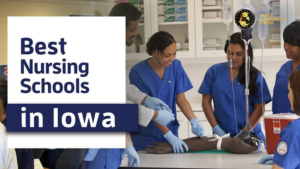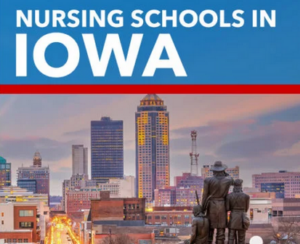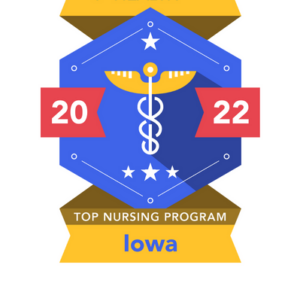The Top Nursing Schools in Iowa
 As Iowa grapples with an increased demand for healthcare professionals amid the ongoing challenges posed by the COVID-19 pandemic, the need for qualified nurses becomes more crucial than ever.
As Iowa grapples with an increased demand for healthcare professionals amid the ongoing challenges posed by the COVID-19 pandemic, the need for qualified nurses becomes more crucial than ever.
This guide navigates the landscape of nursing education in Iowa, shedding light on the top programs available, the process of earning a nursing degree in Iowa, obtaining licensure, and securing employment within the state.
Delve into the comprehensive information presented here to understand the pathway to becoming a nurse in Iowa, including insights into salary expectations, job outlook, and a detailed exploration of the best nursing programs in Iowa.
The Top Nursing Schools in Iowa
1. University of Iowa College of Nursing
- Location: Iowa City, IA
- Website: https://nursing.uiowa.edu
- The University of Iowa College of Nursing is a leading institution for nursing education, offering one of the most prestigious nursing programs in the state. The college provides a comprehensive Bachelor of Science in Nursing (BSN) program, which includes both classroom instruction and extensive clinical experience in various healthcare settings. The University of Iowa also offers a Master of Science in Nursing (MSN) with several advanced practice tracks, including Nurse Practitioner, Nurse Educator, and Nurse Administrator. For those seeking the highest level of education, the Doctor of Nursing Practice (DNP) and PhD in Nursing programs are available to prepare students for leadership, research, and clinical roles in the healthcare field. The College of Nursing is accredited by the Commission on Collegiate Nursing Education (CCNE).
- Campus: Iowa City, IA

- Type: Public
- Accreditation: CCNE
- Tuition: Approx. $11,000 per year (in-state)
- Minimum Time Commitment: 2-4 years (BSN), 2-3 years (MSN)
- Online Available: Yes (for some programs)
- Degree Requirements: BSN, MSN, DNP, PhD
- Programs: Nurse Practitioner, Nurse Educator, Nurse Administrator, DNP, PhD
2. Dordt University Nursing Program
- Location: Sioux Center, IA
- Website: https://www.dordt.edu
- Dordt University offers a highly respected nursing program with a focus on Christian values in healthcare. The Bachelor of Science in Nursing (BSN) program at Dordt University provides students with a well-rounded nursing education, including hands-on clinical experience, to prepare them for a variety of nursing roles. The program emphasizes not only the technical aspects of nursing but also the compassionate care of patients, integrating ethical and moral considerations in healthcare. Dordt also offers an RN-to-BSN program for registered nurses who wish to further their education and career opportunities. The nursing program is accredited by the Commission on Collegiate Nursing Education (CCNE).
- Campus: Sioux Center, IA
- Type: Private
- Accreditation: CCNE
- Tuition: Approx. $35,000 per year
- Minimum Time Commitment: 2-4 years
- Online Available: No
- Degree Requirements: BSN, RN-to-BSN
- Programs: RN-to-BSN
3. Allen College
- Location: Waterloo, IA
- Website: https://www.allencollege.edu
- Allen College is a private healthcare-focused institution that offers a variety of nursing programs, including a Bachelor of Science in Nursing (BSN) and Master of Science in Nursing (MSN) with multiple advanced practice roles, such as Nurse Practitioner and Nurse Educator. The BSN program combines rigorous coursework with extensive clinical practice, preparing students to enter the nursing profession with a high level of competency. Allen College also offers an RN-to-BSN program for registered nurses who want to earn their bachelor’s degree. The MSN program is designed for nurses seeking advanced leadership or clinical roles in healthcare. Allen College is accredited by the Commission on Collegiate Nursing Education (CCNE).
- Campus: Waterloo, IA
- Type: Private
- Accreditation: CCNE
- Tuition: Approx. $18,000 per year
- Minimum Time Commitment: 2-4 years (BSN), 2-3 years (MSN)
- Online Available: Yes (for some programs)
- Degree Requirements: BSN, MSN, RN-to-BSN
- Programs: Nurse Practitioner, Nurse Educator
4. Grand View University School of Nursing
- Location: Des Moines, IA
- Website: https://www.grandview.edu
- Grand View University offers a robust nursing program that prepares students for nursing careers with a focus on both clinical expertise and leadership. The Bachelor of Science in Nursing (BSN) program is designed to provide students with foundational nursing knowledge and hands-on clinical practice to ensure they are ready to enter the workforce. Grand View also offers an RN-to-BSN program for registered nurses seeking to complete their undergraduate education. The university is known for its small class sizes, faculty mentorship, and integration of ethical considerations in nursing practice. Grand View’s nursing programs are accredited by the Commission on Collegiate Nursing Education (CCNE).
- Campus: Des Moines, IA
- Type: Private
- Accreditation: CCNE
- Tuition: Approx. $25,000 per year
- Minimum Time Commitment: 2-4 years (BSN)
- Online Available: Yes (RN-to-BSN)
- Degree Requirements: BSN, RN-to-BSN
- Programs: RN-to-BSN
5. St. Ambrose University School of Nursing
- Location: Davenport, IA
- Website: https://www.sau.edu
- St. Ambrose University offers a highly respected Bachelor of Science in Nursing (BSN) program that prepares students to become competent and compassionate registered nurses. The program integrates theoretical coursework with hands-on clinical experiences, providing students with a well-rounded education in nursing. St. Ambrose also offers an RN-to-BSN program for working registered nurses who want to complete their bachelor’s degree. The university emphasizes the development of critical thinking, communication skills, and leadership in nursing practice. St. Ambrose’s nursing programs are accredited by the Commission on Collegiate Nursing Education (CCNE).
- Campus: Davenport, IA
- Type: Private
- Accreditation: CCNE
Tuition: Approx. $29,000 per year 

Struggling to meet your deadline?
Get your assignment on The Top Nursing Schools in Iowa done by certified MDs and PhDs in the USA. ORDER NOW!
- Minimum Time Commitment: 2-4 years (BSN)
- Online Available: Yes (RN-to-BSN)
- Degree Requirements: BSN, RN-to-BSN
- Programs: RN-to-BSN
6. University of Northern Iowa School of Nursing
- Location: Cedar Falls, IA
- Website: https://www.uni.edu
- The University of Northern Iowa (UNI) offers a Bachelor of Science in Nursing (BSN) program that provides students with both the theoretical knowledge and clinical skills needed to succeed in a nursing career. UNI’s program includes clinical rotations in hospitals, clinics, and long-term care facilities, giving students the hands-on experience necessary for success. The university also offers a Master of Science in Nursing (MSN) with a focus on Nurse Educator roles. UNI’s nursing programs are accredited by the Commission on Collegiate Nursing Education (CCNE), ensuring that students receive an education that meets national standards for nursing practice.
- Campus: Cedar Falls, IA
- Type: Public
- Accreditation: CCNE
- Tuition: Approx. $9,000 per year (in-state)
- Minimum Time Commitment: 2-4 years (BSN), 2-3 years (MSN)
- Online Available: No
- Degree Requirements: BSN, MSN
- Programs: Nurse Educator
7. Iowa Central Community College Nursing Program
- Location: Fort Dodge, IA
- Website: https://www.iowacentral.edu
- Iowa Central Community College offers an Associate of Science in Nursing (ASN) program that prepares students for the NCLEX-RN exam and entry-level nursing positions. The ASN program provides students with a solid foundation in nursing practice, combining classroom learning with clinical experience in various healthcare settings. Iowa Central also offers an LPN-to-RN program for licensed practical nurses looking to become registered nurses. The nursing program is accredited by the Accreditation Commission for Education in Nursing (ACEN), ensuring quality education and preparation for the nursing workforce.
- Campus: Fort Dodge, IA
- Type: Public
- Accreditation: ACEN
- Tuition: Approx. $5,000 per year (in-state)
- Minimum Time Commitment: 2 years
- Online Available: No
- Degree Requirements: ASN
- Programs: Registered Nurse
8. Mercy College of Health Sciences
- Location: Des Moines, IA
- Website: https://www.mchs.edu
- Mercy College of Health Sciences offers both an Associate of Science in Nursing (ASN) and a Bachelor of Science in Nursing (BSN) program. The ASN program is designed to prepare students for the NCLEX-RN and entry-level nursing roles, while the BSN program provides additional coursework and clinical experiences to prepare students for leadership positions in nursing. Mercy College’s nursing programs are accredited by the Commission on Collegiate Nursing Education (CCNE) and the Accreditation Commission for Education in Nursing (ACEN).
- Campus: Des Moines, IA
- Type: Private
- Accreditation: CCNE, ACEN
- Tuition: Approx. $12,000 per year
- Minimum Time Commitment: 2-4 years (BSN), 2 years (ASN)
- Online Available: Yes (for some programs)
- Degree Requirements: BSN, ASN
- Programs: Registered Nurse, RN-to-BSN
These institutions represent some of the best nursing programs in Iowa, offering a variety of degree options from ADN to BSN, MSN, and advanced practice roles. The nursing schools in Iowa are committed to preparing students for the challenges of modern healthcare while providing opportunities for clinical practice, research, and leadership.
How to Choose a Nursing Program in Iowa
When faced with the decision of choosing a nursing program in Iowa, it’s essential to factor in elements that can significantly impact your academic and professional pursuits. Simplify your selection process by delving into aspects such as cost, program duration, available financial aid, and curriculum alignment to ensure a harmonious fit. 
To gauge the effectiveness of a program in preparing its students for a nursing career in Iowa, scrutinize its accreditation status. Additionally, delve into the average National Council Licensure Examination (NCLEX scores Iowa) and graduation rates to ensure a program’s track record aligns with your expectations. Many of the Iowa nursing schools with high NCLEX pass rates will offer insight into how well their graduates perform in the licensing exam.
The Advantages of Pursuing a Nursing Career in Iowa
Iowa nursing careers are growing in demand, with opportunities expanding across various settings. Iowa stands out as an excellent location for aspiring and current registered nurses (RNs) and advanced practice registered nurses (APRNs). With projected employment demand surpassing the national average and boasting one of the lowest costs of living in the nation, Iowa provides a conducive environment for nursing professionals.
A noteworthy aspect contributing to Iowa’s appeal is its participation in the Nurse Licensure Compact (NLC) Iowa. As part of this compact, Iowa, along with 36 other states, adheres to a standardized set of rules and procedures that all licensed RNs must follow.
Moreover, the NLC facilitates a streamlined process for RNs from other participating states to qualify for a license in Iowa with minimal paperwork. Conversely, RNs licensed in Iowa encounter fewer hurdles when practicing in another NLC state.
Salary and Employment Outlook for Nurses in Iowa
Despite RNs in Iowa having one of the lowest average annual salaries at $62,570, according to the U.S. Bureau of Labor Statistics (BLS), the state compensates with a lower cost of living, rated at 90.1 compared to the national average of 100. Nursing salary comparison Iowa indicates that while the wages may be lower, the overall financial burden is mitigated by the affordable living conditions. Nurse practitioners in Iowa earn a higher annual mean wage of $107,910, slightly exceeding the national median of $117,670.
Despite the comparatively lower salaries for RNs in Iowa, healthcare professionals working in the state enjoy the advantage of a low cost of living, indicated by an index of 90.1, notably below the national average of 100. Adding to the appeal, Iowa anticipates a surge in the demand for nurses. As per the Bureau of Labor Statistics (BLS), the state is poised for a substantial 15.1% increase in nursing employment, surpassing the projected national growth rate of 12.1%.
Cities Offering the Highest Salaries for Nurses in Iowa
For those seeking the highest-paying nursing positions in Iowa, metropolitan areas such as Iowa City, Des Moines (West Des Moines), Ames, Cedar Rapids, and Waterloo–Cedar Falls are among the top choices. The following median salary figures for RNs in these cities highlight the competitive pay scales:
| Top Paying Metropolitan Areas | Median Salary for RNs |
|---|---|
| Iowa City | $68,940 |
| Des Moines — West Des Moines | $64,140 |
| Ames | $64,030 |
| Cedar Rapids | $61,540 |
| Waterloo — Cedar Falls | $61,080 |
Source: BLS
Steps to Embarking on a Nursing Career in Iowa
Navigating the path to becoming a nurse in Iowa involves meeting specific nursing licensure requirements Iowa. Aspiring RNs must graduate from a state board-approved nursing program, successfully pass the NCLEX, and undergo a background check. APRNs must fulfill the same criteria as RNs, with the additional requirement of completing a graduate nursing degree Iowa and a specialty certification exam. Continuing education remains a crucial component for both RNs and APRNs to uphold their licensure.
RN Requirements
To attain RN status in Iowa, individuals must graduate from an accredited nursing program with either an associate degree in nursing (ADN) or a bachelor of science in nursing (BSN). Subsequently, prospective nurses need to pass the NCLEX-RN exam and apply for licensure in the state, incurring fees such as a $200 examination fee, $93 application fee, and $50 for a background check.
RNs are obligated to complete a minimum of 36 continuing education hours every three years. Additionally, nurses engaged in the examination, counseling, or treatment of dependent adults or children must undergo training on the identification and reporting of abuse.
APRN Requirements
Aspiring APRN programs in Iowa require candidates to possess an unencumbered RN license, allowing practice within the state. Obtaining a Master of Science in Nursing (MSN) or a Doctor of Nursing Practice (DNP) is a prerequisite, coupled with the successful completion of a national certification exam in a nursing specialty. Fees associated with this process include an examination fee (varying by specialty), an $81 application fee, and a $50 background check fee.
APRNs are required to fulfill a modest 36 contact hours each year to maintain their license. Similarly, training on the identification and reporting of abuse is mandatory for those who regularly engage in the examination, counseling, or treatment of dependent adults or children.
Frequently Asked Questions About Nursing in Iowa
How long does it take to become an RN in Iowa?
The timeline for becoming an RN in Iowa varies based on the chosen academic path. Full-time students can complete an ADN program in two years and a BSN in four years. A part-time schedule may extend this timeline. Pursuing an MSN program typically requires two years of full-time enrollment after earning a BSN and gaining two years of clinical experience, resulting in a potential total of up to eight years to start practicing as an APRN.
Is Iowa a good state for nursing?
Iowa stands out as an attractive state for nursing professionals due to its low cost of living, projected demand for healthcare professionals, and participation in the Nurse Licensure Compact (NLC) Iowa. Nursing job outlook Iowa is positive, with a substantial demand for both RNs and APRNs.
Does an online nursing degree have the same value as an on-campus degree?
The value of an online nursing degree, much like an in-person program, hinges on the institution offering it. Notably, over 90% of students who attended online programs at Allen College, Graceland University, Mount Mercy University, Northwest Iowa Community College, and the University of Iowa passed the NCLEX on their first attempt, underscoring the effectiveness of these online nursing degrees in Iowa in preparing future nurses.
Is Iowa a compact state?
Yes, Iowa is a compact state. In 1998, the Iowa State Board of Nursing initiated compact legislation, which became active in 2000. This allows Iowa nurses to obtain a multistate license, enabling them to practice in other compact states. Conversely, those moving to Iowa from another compact state must apply for primary licensure in Iowa.
In conclusion, Iowa provides a promising landscape for nursing careers in Iowa, and with careful consideration and planning, individuals can embark on a fulfilling and successful nursing career in the state. Whether pursuing an online nursing degree Iowa or enrolling in accredited nursing programs in Iowa, prospective nurses will find numerous resources to support their educational and professional growth.

Dont wait until the last minute.
Provide your requirements and let our native nursing writers deliver your assignments ASAP.

